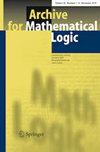度量空间的分离性和选择公理
IF 0.4
4区 数学
Q1 Arts and Humanities
引用次数: 0
摘要
在没有选择公理的集合论中,我们证明了 "对于每一个具有博勒度量(\mu \)的度量空间(X,d),使得每一个开球的度量都是正的、有限的,(X,d)是可分的 "这一断言是由可数集合的选择公理所隐含的,并且隐含着有限集合的可数集合的选择公理。我们还证明,在弱化了原子存在的泽尔默罗-弗伦克尔集合论中,这两个蕴涵都不是可逆的,而在泽尔默罗-弗伦克尔集合论中,第二个蕴涵也不是可逆的。这就回答了 Dybowski 和 Górka 的一个问题(Arch Math Logic 62:735-749, 2023. https://doi.org/10.1007/s00153-023-00868-4)。本文章由计算机程序翻译,如有差异,请以英文原文为准。

Separablilty of metric measure spaces and choice axioms
In set theory without the Axiom of Choice we prove that the assertion “For every metric space (X, d) with a Borel measure \(\mu \) such that the measure of every open ball is positive and finite, (X, d) is separable.’ is implied by the axiom of choice for countable collections of sets and implies the axiom of choice for countable collections of finite sets. We also show that neither implication is reversible in Zermelo–Fraenkel set theory weakend to permit the existence of atoms and that the second implication is not reversible in Zermelo–Fraenkel set theory. This gives an answer to a question of Dybowski and Górka (Arch Math Logic 62:735–749, 2023. https://doi.org/10.1007/s00153-023-00868-4).
求助全文
通过发布文献求助,成功后即可免费获取论文全文。
去求助
来源期刊

Archive for Mathematical Logic
MATHEMATICS-LOGIC
CiteScore
0.80
自引率
0.00%
发文量
45
审稿时长
6-12 weeks
期刊介绍:
The journal publishes research papers and occasionally surveys or expositions on mathematical logic. Contributions are also welcomed from other related areas, such as theoretical computer science or philosophy, as long as the methods of mathematical logic play a significant role. The journal therefore addresses logicians and mathematicians, computer scientists, and philosophers who are interested in the applications of mathematical logic in their own field, as well as its interactions with other areas of research.
 求助内容:
求助内容: 应助结果提醒方式:
应助结果提醒方式:


